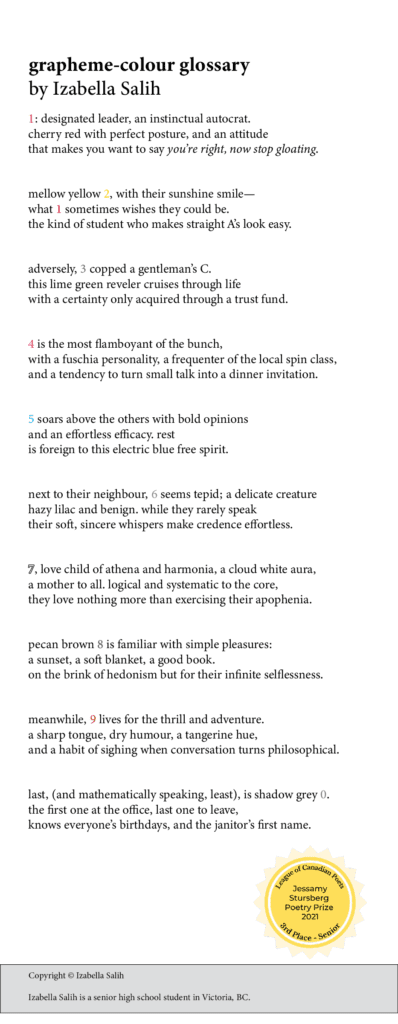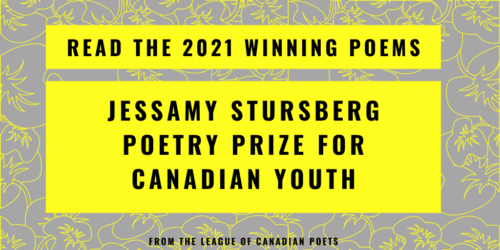2021 Jessamy Stursberg Youth Poetry Prize Winners
Congratulations to the 2021 Winners of the Jessamy Stursberg Poetry Prize!
The Jessamy Stursberg Poetry Prize for Canadian Youth was established to foster a lifelong relationship between Canadian youth and the literary arts, specifically poetry. The prize is supported through a generous donation from the Stursberg family and other donors in honour of Jessamy Stursberg. The prize accepts submissions from young poets all across Canada, with three prizes awarded in both the Junior (grades 7 to 9) and Senior (grades 10 to 12) categories:
Winner: $400
Second Place: $350
Third Place: $300
Senior winners
Jury: Melanie Flores, Grace Lau & JC Sulzenko
First place, senior: How to Write a Poem by Angela Cen

From our jurors: This is a well-crafted highly original work. The poet’s use of metaphor and hyperbole is masterful and evokes an abstract, yet very real, impression. A pleasure to read and savour.
Second place, senior: Jiaozi by Vanessa Chan

From our jurors: This poem’s gift is its tenderness, an offering of nostalgia drawn from the poet’s memory. It is a wonderful balance of creative metaphors, vulnerability, and reflection. A pleasure to read and reread.
Third place, senior: grapheme-colour glossary by Izabella Salih

From our jurors: A poem of surprising originality, elegance of craft and form, and close attention to grammar, with the bonus that it’s whimsical and amusing.
Junior Winners
Jury: Laura Cok, Samantha Jones & Matthew Stepanic
First place, junior: Seaweed Soup and a Happy Birthday by Mark Kim
Seaweed Soup and a Happy Birthday
by Mark Kim
A tradition for life,
for death, and everything in between.
Narrowed into a warm bowl,
with an emerald glow,
and dark leaves.
My vision is adjusted to the shades,
the intricacy of the recipe,
and history.
A year of life passes,
another bowl filled,
and the aroma of vitality pollutes the day.
The broth of sea,
greens of the water,
and a reminder of my past, present, future.
The surface is broken,
ripples undulate,
and I’m back.
Mom asks how it tastes,
it’s good. A little salty.
It doesn’t matter.
Good morning,
good night, and everything in between.
From our jurors: In ‘Seaweed Soup and a Happy Birthday” the poet’s careful and developed craft is on full display. This poem showcases not only their ability to use plain language to delve into their personal history, but they also know how to pack a punch in stunning image and spend the full value of a five-dollar word. The poem’s thoughtful form and phrasing made it a clear and unanimous first choice for all of us.
Second place, junior: undefined variables by Michelle Masood
undefined variables
by Michelle Masood
lunch time was not defined.
not by the food rotting in my bag,
not by my coming, slow and unwanted, not by my leaving
not the music leaking from my headphones,
no, not the wind either. not the oranges, not the bite.
not the vines twisting between the creek and the table, nor the footsteps twisting between the
creak of the table.
not the crosswalk passing by without even a wave.
not the frenetic fidgeting with the tea thermos.
no, it was not defined by the book pages weighing down
the empty desk, the tangled up headphone wires, they weren’t it.
it wasn’t the morning dew on the walk to school, or the sun’s light
sifting through the clouds.
not the patches of daisies, or the pigeons cuddled up together.
just like it wasn’t the moon’s pale imprint stamped into the sky,
or the stars in hiding behind her.
not the pools of ink and graphite on my hands,
not the clouds of pot, full of boys like the beatles wandering into math class
and turning half the kids into stone.
but that wasn’t it either.
not the headache attached to your reflection,
not the itch you can’t scratch, not the stretch of your back when you try to.
no, not the moths settling for streetlamps,
not their wings folding and being picked off by kids on the playground.
not the anomalous dandelion, four flowers crowded all into one,
fighting to survive.
not quite human, but almost.
From our jurors: In “undefined variables”, a simple lunch scene is deconstructed by the speaker searching for meaning by sloughing off the things it is not. We loved the strong imagery, the inventive style, and the way the speaker keeps moving towards an essential truth just out of reach, and nearly grasps it.
Third place, junior: I am a woman by Nida Atique
I am a woman
by Nida Atique
I am a woman
Red, blood pooling between my legs. Red, goes my brain, blank and confused.
I run to my mother, whose red saree is swaying in the wind.
Red go her cheeks, as I exclaim what is coming out of me.
Red is the colour to describe my fathers’ anger, who says to never speak about it again.
A red cloth placed over my head. I must be hidden away from the men.
Red, my mother says, means I am a woman.
I am a woman
Red, the colour of the heavy lehenga I am forced to wear.
The rich mehndi soaked deep into my skin, creating an intricate red design.
Sticky red lipstick, smelling of strong synthetics and starch.
A small red bindi, placed on my forehead. A symbol of a married woman.
Red, the hue of the turban of a man I’ve never seen.
The man who I must spend the rest of my life with.
I am a woman
Red again, but not the one from before. At first, they said not to bleed, now they wait for more?
They waited and waited, for a sign of virginity to make sure I was pure.
It is a check for your honour, my mother had said, but how did my honour get down there?
And so nothing came, the sheets smiling bright white.
He starts to see red, and his hand goes smack, a dark red bruise spreading across my face
You deserve it he says, but I wish to ask why.
I am a woman
Silky red pillowcases, matching curtains too,
My dowry that’s been collecting since I was two.
Red spices and sweets all enter the house,
Glaring red eyes, appraising each item.
He says it’s not enough, that some stuff must be missing.
Am I not sufficient, or do my materials mean more?
I am a woman
The last of the blood, seeing red after a painful nine months.
A faint cry, a bright red baby placed into my arms.
It is supposed to be a joyous occasion.
But they all whisper “Its a girl, what a burden”
Insincere smiles as they pray over the child.
And I fear, when she grows ups, will she be a woman?
From our jurors: The potent imagery in “I am a woman” immediately grabbed our attention. We loved the way that the colour red was used as an anchor to connect different scenes from a life story. The volta at the end of this piece is a revelation that left us thinking long after we put the poem down.

